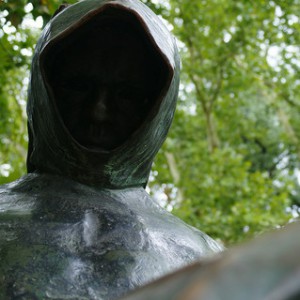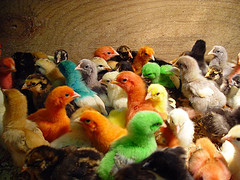[This article is also available in Polish and Italian. Thanks a lot to Arek and Valentina for the translations!]
 Newly initiated witches, or even those who follow a solitary path, are sooner or later encountered with those five words: ‘Keep Pure Your Highest Ideal’.
Newly initiated witches, or even those who follow a solitary path, are sooner or later encountered with those five words: ‘Keep Pure Your Highest Ideal’.
Eventually, what seems like a precious and inspiring advice becomes a challenge. Those five words had a special meaning for me when I became a witch, and have been highlighted all along my path. Every time I had to make a decision between what I considered to be more adequate and what I was expected to do, it came to my mind like a mantra:
‘Keep pure your highest ideal; strive ever toward it; let naught stop you, nor turn you aside.’1
At first I thought that it had a lot to do with my Aquarius rising — you know, I’m an idealist. However, in the course of time, I realised that it had much more to do with Witchcraft as a whole; and with the role that our personal ethics (or rather, ideals) play in it.
Depersonalisation
In the Wiccan and magical community I have, many times, encountered the concept of depersonalisation as a requirement, or a desirable trait, for the operation of magic (or the Craft).
Statements like ‘When you strip yourself, you leave your identity outside of the Circle’, or ‘You assume a new name, and leave your identity outside’, seemed to be surprisingly welcomed and encouraged.
 This triggered a lot of inner (and even external) dialogue: ‘How do we enter the Circle?’, ‘How much of ourselves do we bring in?’, or ‘How much of our ideas, emotions, ideals and thoughts make it to that place between the worlds?’. In the end, the answer became quite clear: all of it.
This triggered a lot of inner (and even external) dialogue: ‘How do we enter the Circle?’, ‘How much of ourselves do we bring in?’, or ‘How much of our ideas, emotions, ideals and thoughts make it to that place between the worlds?’. In the end, the answer became quite clear: all of it.
You see, if the Craft is about transformation, there’s no way we are going to transform something that is left on the doormat. Furthermore, while many people love to emphasize how important is to ‘transcend’, the thing is, we do not transcend. Even during specific trance work, if we actually transcended our ‘ego’, we would be done. Finito.
Anyone talking about ‘how people should transcend’ is engaging in the same behaviour of people who talk about ‘how people should be more mature’. And we all know what we’re talking about here… But whether we like it or not, we witches are still very human. In fact, probably because we are stirring up all those individual traits in the process of transformation, they become more apparent.
It is our entire being that becomes initiated and/or devoted to the service of the Gods and the forces divine. When we strip ourselves, we are not stripping our own personal traits and leaving them outside, in fact, we are making them more apparent and sharing them with our fellow coveners and the Gods.
We will, of course, want to keep the ritual conversation focused and keep ‘very mundane’ topics outside. However, this can be found in any other context where people are required to focus in a certain aspect, and has nothing to do with leaving part of ourselves behind.
Intent: the Craft from the Heart and the Gut
If anything, personal traits are, in fact, the axis of the practice of the Craft, and they should be cherished and encouraged.
The main source of power for any magical work is intent. It is through intent that we direct the energy raised and bind the spells. It is through intent that we operate and practise our Craft.
 Intent comes from certainty and understanding. And that’s why we regard and celebrate the seasonal festivals: through the contemplation of this cycle we become aware and synchronised with the underlying patterns and rhythms of the Earth – and thus, the Universe.
Intent comes from certainty and understanding. And that’s why we regard and celebrate the seasonal festivals: through the contemplation of this cycle we become aware and synchronised with the underlying patterns and rhythms of the Earth – and thus, the Universe.
This understanding, when settled and integrated in our deep mind, becomes certainty (though, a relative one, since this process starts all over again, never reaching an absolute certainty).
Without intent, there is no successful practice of the Craft — just empty words and movements followed to the letter. The Craft comes from the deepest part of our heart, and our gut.
When I realised this, I also realised that, if I wasn’t true to my ideals, if what I do didn’t come from the gut, I wouldn’t be able to practise magic.
It just wouldn’t work.
In the same way as having an intimate relationship with someone we despise.
Let naught stop you, nor turn you aside
 Unfortunately, keeping pure our highest ideal is not as easy as it seems. Many times it means challenging the status quo; which, in turn, generates disapproval from those who fiercely defend it.
Unfortunately, keeping pure our highest ideal is not as easy as it seems. Many times it means challenging the status quo; which, in turn, generates disapproval from those who fiercely defend it.
In that sense, it is easier to simply go with the majority. This is a very common human trait, shown by Solomon Asch’s popular experiment, in which a subject is asked to participate in a survey with other participants.
The truth is, the other participants have been asked to give collective, incorrect answers to very clear questions, aiming to change the subject’s opinion. Guess what? On a number of occasions it really worked:
‘They were never aware that the majority gave incorrect answers. Other participants exhibited a “distortion of judgment” (most belonged to this category). This meant that participants got to a point where they realized that they must be wrong and that the majority must be right, leading them to answer with the majority’.
For solitary practitioners, this may take form of opinions read in online groups, fora, blogs or even books from renowned authors. In the context of a Tradition, it may be perceived through the interaction with other initiates or groups.
In traditional forms of Wicca, this is even more relevant. Given the autonomy of each coven and the use of mutual acceptance/recognition as means of social and external validation, challenging the status quo could mean jeopardising one’s own acceptance and progression.
The ‘I’ in Team
One of the most common reactions to the above is to challenge the decision of the person to be part of a specific group while keeping their own ideals. It’s a replication of the famous ‘There’s no I in Team’, but with a religious approach — the underlying message being that one should submit to the ‘principles’ or ‘collective ideals’, leaving his/her own aside.
However, Wicca is an experiential, mystic and orthopraxic religion and, as such, the experience of it is utterly individual and non-transferrable.
I am sure that some may ask: ‘How can you say that you are practising the same religion, then?.’ Well, because I’ve been initiated into a group of that specific religion.
 What makes a coven is not the sharing of the exact same beliefs, but the bond between its members. Likewise, the members of a family don’t have to (and usually don’t) think the same way; yet, they are still considered part of the same unity. It’s the bond that connects all the members of the group and makes a collective of them, and thus, gives them power — it has nothing to do with thinking the same way.
What makes a coven is not the sharing of the exact same beliefs, but the bond between its members. Likewise, the members of a family don’t have to (and usually don’t) think the same way; yet, they are still considered part of the same unity. It’s the bond that connects all the members of the group and makes a collective of them, and thus, gives them power — it has nothing to do with thinking the same way.
If the Circle is a place of Love and Trust, a place of Transformation and becoming our True Selves, then it’s a place where our ideals not only have a place, but a very important one.
Like Morgana mentions in her article ‘The Collective Individual’:
‘In the Craft we recognise both these aspects. On the one hand we advocate self-development, whilst the group experience is also important.’
Between these two we find the rhythm.
It is said that every time a new witch joins the circle, the whole of the group (and its egregore) is affected. The entire mechanism starts working until the new gear has found it’s rightful place, and it settles again.
The same happens when someone leaves.
Therefore, it’s obvious that our individual traits do in fact influence the pre-existing egregore of a working group, and they are essential in the path of becoming who we really are; both as witches, and as human beings.
1 The Charge of the Goddess, Doreen Valiente. via Doreen Valiente Foundation under CC
photo credit: freemasonry via photopin (license); Gallus Anonymus via photopin (license); passion by Eba Fernández under CC; bear by baikahl; diversity clucks by chris under CC

I wonder when someone will publish something reliable in portuguese.
Wiccan Rede has always been a bilingual magazine, publishing articles both in Dutch and English. But you can check out some of the articles in Spanish in http://silvercircle.es
Unfortunately, no…no Portuguese…